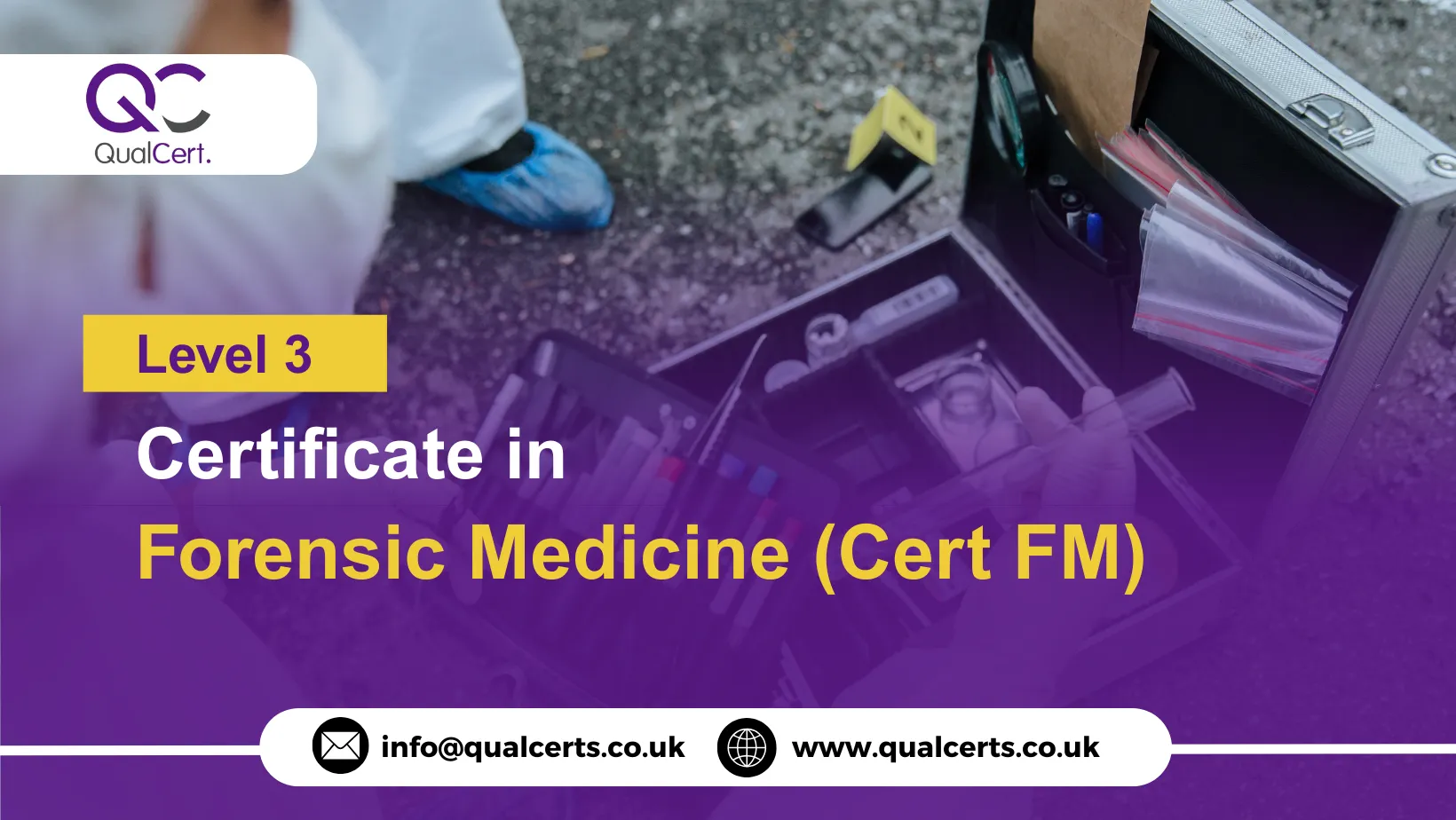The QualCert Level 3 Certificate in Forensic Medicine (Cert FM) is a specialised qualification designed for healthcare and legal professionals who wish to gain advanced knowledge in the field of forensic medicine. This course provides comprehensive insights into the medical and legal aspects of examining injuries, understanding cause of death, and supporting criminal investigations. It equips learners with the essential skills to apply forensic principles in real-world healthcare, law enforcement, and legal settings.
The curriculum covers a wide range of topics, including post-mortem examination procedures, injury assessment, evidence preservation, medico-legal documentation, and ethical considerations in forensic practice. Emphasis is placed on understanding the legal framework surrounding forensic investigations, accurate reporting, and collaborating effectively with law enforcement and legal teams. The course combines theoretical knowledge with practical case studies to enhance critical thinking and problem-solving skills in forensic scenarios.
This qualification is ideal for nurses, doctors, paramedics, allied health professionals, and legal practitioners who are involved or wish to specialise in forensic cases. It also benefits professionals working in hospitals, mortuaries, law enforcement, or criminal justice sectors who require formal recognition of their forensic medicine expertise.
The QualCert Level 3 Certificate in Forensic Medicine adheres to UK professional standards and international best practices, ensuring that learners are fully prepared to apply forensic medicine principles safely and ethically. By completing this course, professionals can enhance their career prospects, demonstrate formal certification in forensic medicine, and contribute effectively to multidisciplinary teams handling forensic cases.
Course Contents of QualCert Level 3 Certificate in Forensic Medicine (Cert FM):
TheQualCert Level 3 Certificate in Forensic Medicine (Cert FM), offers 20 Credits, requiring a Total Qualification Time (TQT) of 100 hours, including 70 Guided Learning Hours (GLH).
| Unit Ref# | Unit Title | Credit | GLH | TQT |
| QC27093-1 | Principles of Forensic Medicine | 4 | 14 | 20 |
| QC27093-2 | Injury Assessment and Documentation | 4 | 14 | 20 |
| QC27093-3 | Post-Mortem Examination and Cause of Death Analysis | 4 | 14 | 20 |
| QC27093-4 | Evidence Preservation and Chain of Custody | 4 | 14 | 20 |
| QC27093-5 | Professional Practice and Multidisciplinary Collaboration | 4 | 14 | 20 |
Entry Requirements for the QualCert Level 3 Certificate in Forensic Medicine (Cert FM):
Minimum Age
- 18 years or older
Educational Background
- Level 2 qualification in Health and Social Care, Nursing, or a related medical field
- GCSEs in English and Science are preferred
Experience
- Previous experience in healthcare, forensic, or legal-related roles is recommended
- Experience in clinical assessment, patient care, or evidence handling is advantageous
Language Proficiency
- Competency in English is required for course participation and assessment
- International learners may need to provide evidence of English proficiency, such as IELTS 5.5 or equivalent
Learning Outcomes for the QualCert Level 3 Certificate in Forensic Medicine (Cert FM):
Principles of Forensic Medicine
- Introduces the scope, purpose, and role of forensic medicine in healthcare and legal systems
- Covers ethical and professional responsibilities for forensic practitioners
- Explains medico-legal frameworks and standards for practice
Injury Assessment and Documentation
- Focuses on recognising, assessing, and documenting injuries accurately
- Teaches identification of accidental, intentional, and neglect-related injuries
- Emphasises correct reporting for medico-legal purposes
Post-Mortem Examination and Cause of Death Analysis
- Explains post-mortem procedures and interpretation of findings
- Covers determination of cause and manner of death
- Introduces evidence-based approaches to support investigations
Evidence Preservation and Chain of Custody
- Teaches collection, preservation, and handling of forensic evidence
- Emphasises maintaining chain of custody and documentation for legal proceedings
- Ensures compliance with national and international forensic standards
Professional Practice and Multidisciplinary Collaboration
- Focuses on teamwork with law enforcement, legal teams, and healthcare professionals
- Highlights ethical decision-making, professional conduct, and patient safety
- Promotes reflective practice for continuous improvement in forensic medicine
This course is suitable for a range of professionals who wish to specialise in forensic medicine or enhance their expertise in medico-legal practice. It is ideal for:
- Healthcare Professionals: Nurses, doctors, paramedics, and allied health staff involved in clinical assessments and patient care.
- Legal and Forensic Practitioners: Individuals working in law enforcement, criminal investigations, or the legal system requiring knowledge of medico-legal procedures.
- Career-Focused Individuals: Professionals aiming to advance their careers in forensic medicine, criminal justice, or related fields.
- Individuals Seeking Formal Recognition: Those who wish to achieve certified evidence of their skills, knowledge, and competence in forensic medicine.
This course should be delivered by centres that meet the following standards to ensure high-quality training and assessment in forensic medicine:
- Qualified Trainers and Assessors: Centres must have experienced healthcare and forensic professionals who can provide expert instruction and assess learners effectively.
- Facilities and Resources: Access to clinical or simulated forensic environments, appropriate medical and forensic equipment, and up-to-date learning materials is required.
- Health and Safety Compliance: Centres must follow strict infection control, patient safety, and evidence-handling protocols in line with national and international standards.
- Quality Assurance: Centres should have systems in place to monitor learner progress, maintain assessment standards, and implement continuous improvement processes.
- Learner Support: Academic and pastoral support must be available, including provisions for learners with additional needs, to ensure all participants can achieve the required competence.

